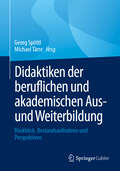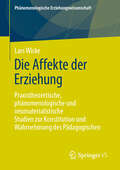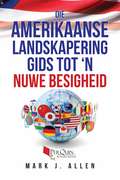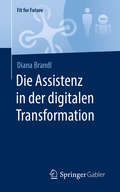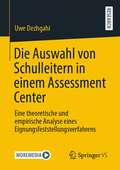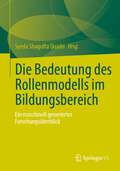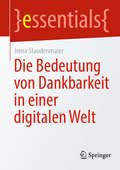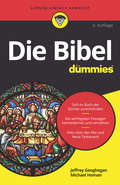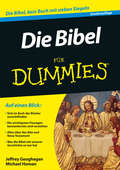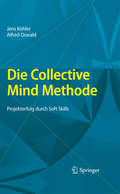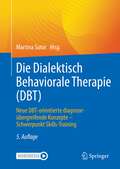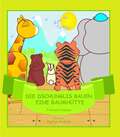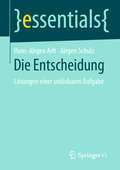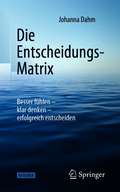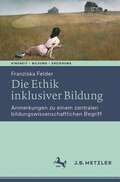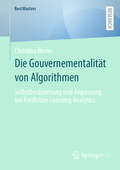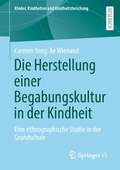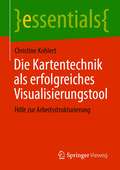- Table View
- List View
Didaktiken der beruflichen und akademischen Aus- und Weiterbildung: Rückblick, Bestandsaufnahme und Perspektiven
by Georg Spöttl Michael TärreAufgrund der Vielfalt der Adressatengruppen, der Zugänge, der Lernorte sowie der curricularen Orientierungspunkte stellen Didaktiken der beruflichen und akademischen Aus- und Weiterbildung einen ausgesprochen heterogenen Gegenstandsbereich dar. Insofern ist festzustellen, dass es eine Didaktik der Aus- und Weiterbildung nicht gibt bzw. nicht geben kann. Dennoch stehen Bildungseinrichtungen sowie Lernende und Lehrende vor immensen und ähnlichen Herausforderungen. Dieses Werk präsentiert aktuelle Ansätze von beruflichen Didaktiken mit dem Ziel, den kritisch-konstruktiven Diskurs anzuregen.
Die Abenteuer des Pinchy Crab und Ramon D'Escargot
by Dan AlatorreMit vielen netten Bilder für Kinder eine amüsante Bilderbuch, "Die Abenteuer des Pinchy Crab und Ramon D'Escargot" erzählt die Geschichte eines kleinen Krabben, die eine verlorene Schnecke namens Ramon entdeckt. Sie werden Freunde mit einem kleinen Mädchen und einer Möwe, und vier von ihnen zusammen zu arbeiten, um zu versuchen, um sicher nach Hause zu bekommen Ramon, aber wenn das nicht funktioniert, bekommen sie kreativ. Teamwork ist wichtig, da wird einfallsreich, anderen zu helfen, neue Freunde, die anders sind als wir, und das Beste von Situationen, die kleinen Kindern kann schwierig finden, wie ein Umzug in ein neues Zuhause. Sehr geeignet für Eltern, um Kinder im Vorschulalter oder für etwas ältere Kinder zu lesen, um zu ihren Eltern zu lesen!
Die Affekte der Erziehung: Praxistheoretische, phänomenologische und neumaterialistische Studien zur Konstitution und Wahrnehmung des Pädagogischen (Phänomenologische Erziehungswissenschaft #15)
by Lars WickeEmotionen und Affekte spielen in der Erziehung eine zentrale Rolle. Allerdings wird dieser Zusammenhang bislang vor allem mithilfe psychologischer Ansätze beleuchtet. Dabei geraten soziale Dimensionen der Erziehung aus dem Blick. Dieses Buch fragt demgegenüber in Bezug auf praxistheoretische, phänomenologische und neumaterialistische Affektverständnisse nach der Konstitution und Wahrnehmung von Erziehung als einem sozialen Phänomen. Im Zentrum steht die These, dass Erziehung im dynamischen Zusammenwirken von Praktiken und Diskursen und in den Beziehungen zwischen menschlichen und nicht-menschlichen Körpern entsteht und vor dem Hintergrund der darin enthaltenen affektiven Dimensionen intelligibel wird. In der Interpretation von videografierten Szenen aus Kita, Schule und Universität werden Figuren des Affektiven ausgearbeitet, in denen jene Momente der Konstitution und der Wahrnehmung des Pädagogischen, auch in ihrer Untrennbarkeit voneinander, deutlich werden. Der Affektbezug erscheint dabei selbst als Methode und insofern als Bezugspunkt einer relationalen Theorie und Empirie des Pädagogischen.
Die Amerikaanse Landskapering Gids Tot 'n Nuwe Besigheid
by Mark J. AllenJy het sopas die eerste stap geneem om jou eie baas te word. ‘n Dag gemors beteken minder geld in jou sak, so kom ons begin dadelik… Dit mag dalk na ‘n slegte idee klink om jou eie besigheid te begin wanneer mense om jou hulle s’n verloor, maar solank jy weet wat jy doen en met die regte gereedskapstel om die werk gedoen te kry en jy het die selfvertroue in jou vermoë om ‘n beter diens te verskaf as jou mededingers, kan jy uitgaan en ‘n beter lewe vir jouself skep, en met tyd, ‘n winsgewende en lonende besigheid bou. So hoe doen jy dit? Jy begin klein en jy dink GROOT…
Die Assistenz in der digitalen Transformation (Fit for Future)
by Diana BrandlDie Arbeitswelt 4.0 ist vor allem durch die zunehmende Digitalisierung geprägt. Viele Prozesse werden immer stärker digital unterstützt, bis hin zur vollständigen Automatisierung. Das hat Auswirkungen auf das Berufsbild und die Aufgaben der Assistenz und bringt sowohl Herausforderungen als auch Chancen mit sich.Dieses Buch stellt die sich wandelnde Rolle der Assistenz im Office 4.0 und deren gestalterische Möglichkeiten vor. Dazu portraitiert es die Meinungen verschiedener Assistenzen und Entscheider in renommierten Unternehmen, die wertvolle Einblicke in ihren Arbeitsalltag geben. In diesem Zusammenhang werden auch die Technologie der digitalen Assistenten und deren Nutzungsmöglichkeiten im Büroalltag ausführlich beleuchtet und viele praktische Tools vorgestellt, die Arbeit abnehmen und Raum für neue Aufgaben schaffen können. Zahlreiche Beispiele aus der Praxis geben inspirierende Anregungen und zeigen, dass Management-Assistenzen ein wichtiger Treiber der digitalen Transformation sind.Über die Buchreihe "Fit for Future"Die Zukunft wird massive Veränderungen im Arbeits- und Privatleben mit sich bringen. Tendenzen gehen sogar dahin, dass die klassische Teilung zwischen Arbeitszeit und Freizeit nicht mehr gelingen wird. Eine neue Zeit – die sogenannte „Lebenszeit“ – beginnt. Laut Bundesregierung werden in den nächsten Jahren viele Berufe einen tiefgreifenden Wandel erleben und in ihrer derzeitigen Form nicht mehr existieren. Im Gegenzug wird es neue Berufe geben, von denen wir heute noch nicht wissen, wie diese aussehen oder welche Tätigkeiten diese beinhalten werden. Betriebsökonomen schildern mögliche Szenarien, dass eine stetig steigende Anzahl an Arbeitsplätzen durch Digitalisierung und Robotisierung gefährdet sind. Die Reihe „Fit for future“ beschäftigt sich eingehend mit dieser Thematik und bringt zum Ausdruck, wie wichtig es ist, sich diesen neuen Rahmenbedingungen am Markt anzupassen, flexibel zu sein, seine Kompetenzen zu stärken und „Fit for future“ zu werden. Der Initiator der Buchreihe Peter Buchenau lädt hierzu namhafte Experten ein, ihren Erfahrungsschatz auf Papier zu bringen und zu schildern, welche Kompetenzen es brauchen wird, um auch künftig erfolgreich am Markt zu agieren. Ein Buch von der Praxis für die Praxis, von Profis für Profis. Leser und Leserinnen erhalten „einen Blick in die Zukunft“ und die Möglichkeit, ihre berufliche Entwicklung rechtzeitig mitzugestalten.
Die Ausbildung zum Berater: Für eine kompetente Beratung in Organisationen
by André NiggemeierDas vorliegende Werk richtet sich an Menschen, die mit dem Gedanken spielen ein Studium zum Beratenden aufzunehmen. Zudem richtet es sich an angehende Beraterinnen und Berater sowie an Personen, die an der Curriculumentwicklung von berufs- und organisationsbezogener Beratung mitwirken. Nicht zuletzt nimmt die Untersuchung Personen in den Fokus, die einen Überblick über die Möglichkeiten und Grenzen der akademischen Ausbildung von Beraterinnen und Beratern erlangen wollen.
Die Auswahl von Schulleitern in einem Assessment Center: Eine theoretische und empirische Analyse eines Eignungsfeststellungsverfahrens
by Uwe DezhgahiSchulleitung hat sich zu einem eigenständigen Beruf entwickelt. Obwohl alle Bundesländer vielfältige Kompetenzanforderungen an Schulleitung in ihren Schulgesetzen definiert haben, erfolgt die Schulleiterauswahl nur in Nordrhein-Westfalen kompetenzbasiert durch ein Assessment Center. In dieser Studie werden die rechtlich, pädagogisch und führungstheoretisch begründeten Anforderungen an die Schulleiterauswahl erläutert und die Einhaltung dieser Anforderungen sowie der wissenschaftlichen Gütekriterien am Beispiel des Eignungsfeststellungsverfahrens für angehende Schulleiterinnen und Schulleiter in Nordrhein-Westfalen (EFV) untersucht. Der Autor Uwe Dezhgahi ist wissenschaftlicher Mitarbeiter an der Professur für Empirische Bildungsforschung der Universität Kassel. Seine Arbeitsschwerpunkte liegen in den Themenbereichen Professionalisierung von pädagogischen Führungskräften sowie Migration und Bildung.
Die Avonture van Knypie Krap en Ramon D'Escargot
by Dan Alatorre Petro Ebersöhn'n Klein dogtertjie gaan saam met haar gesin strand toe waar sy vriende maak met 'n krappie en sy maats. Alles gaan goed totdat 'n klein vreemdeling na 'n storm op die strand uitspoel en sy besluit om saam met haar vriende te probeer om hom weer terug te kry by sy huis - in Frankryk! Geniet hierdie volkleur, geïllustreerde kinderboek saam met jou kind! Ideaal om vir jou kleuter voor te lees, of vir die wat bietjie ouer is om vir jou te lees!
Die Bedeutung des Rollenmodells im Bildungsbereich: Ein maschinell generierter Forschungsüberblick
by Syeda Shagufta QuadriDieses Buch ist ein Ergebnis der Anwendung von künstlicher Intelligenz in der Literatur. Es ist ein Versuch, KI für bessere Ergebnisse im Forschungsbereich einzusetzen. Es war keine einfache Aufgabe, eine Literaturübersicht über das Thema "Rollenmodellierung" zu finden, da es sehr umfangreich und unsystematisch ist, aber der Einsatz von KI lieferte ein tieferes und umfassenderes Bild. Dieses Buch bietet den Lesenden Beispiele dafür, wie wichtig Rollenmodelle im Leben von Schüler*innen sind. Es enthält Kapitel zu verschiedenen Themen, die für Student*innen und Lehrkräfte von Nutzen sein können.
Die Bedeutung von Dankbarkeit in einer digitalen Welt (essentials)
by Irena StaudenmaierDieses inspirierende Büchlein erinnert uns daran, warum es wichtig ist, inmitten der digitalen Revolution dankbar zu sein. Mit praktischen Übungen, inspirierenden Geschichten und einer ermutigenden Perspektive ist es eine wertvolle Ressource für jeden, der nach mehr Erfüllung und Zufriedenheit in einer digitalen Welt sucht. Es bietet einen einzigartigen Blickwinkel auf Dankbarkeit in einer digitalisierten Welt. Die Autorin unterstützt mit praktischen Ratschläge und Übungen, die helfen, die vorgestellten Konzepte im eigenen Leben anzuwenden.
Die Bedeutung von Übergangsritualen in reflexiver Beratung
by Antje PfabIn der Gegenwartsgesellschaft rückt die individuelle Lebensgestaltung und Verantwortung für ein als gelungen erlebtes Leben in den Vordergrund. Bereitschaft zu Wandel und Weiterentwicklung ist dabei sowohl in der Arbeitswelt gefordert als auch beim Wechsel von Lebenslagen und –phasen. Gleichzeitig ist in der Gegenwartsgesellschaft eine Abnahme der Bedeutung von Übergangsritualen zu beobachten, dagegen eine Zunahme reflexiver Beratungsformate, in denen (insbes. im Coaching) Transformationsprozesse, Übernahme neuer Rollen und Funktionen und als krisenhaft erlebte Berufssituationen thematisiert werden. Das Buch beschäftigt sich mit der Frage, welchen Stellenwert Übergangsrituale in der reflexiven Beratung haben. Die empirische Untersuchung zeigt, dass Übergangsrituale im Beratungs- und Therapiediskurs präsent sind. Unter Berücksichtigung soziologischer und sozialphilosophischer Theorien sowie des ritualtheoretischen Diskurses wird ein Konzept von Übergangsritualen in reflexiver Beratung entwickelt, das eine weitergehende Unterstützung von Transformationsprozessen erlaubt. Darüber hinaus werden auch Rückschlüsse auf eine zeitgemäße Gestaltung von Übergangsritualen in der individualistisch geprägten Gegenwartsgesellschaft außerhalb des Beratungskontexts erörtert.
Die Begegnung von Familie und Schule im Lernentwicklungsgespräch: Eine Frage der Anerkennung (Rekonstruktive Bildungsforschung #36)
by Larissa HabeckLarissa Habeck erforscht in dieser Arbeit die hamburgspezifische Form des Eltern-Lehrer*innen-Schüler*innen-Gesprächs, das Lernentwicklungsgespräch, aus Perspektive einer kooperativen Funktion im Verhältnis von Familie und Schule. In einem rekonstruktiven Forschungsdesign werden anhand von 15 audiografierten Lernentwicklungsgesprächen die im bisherigen Forschungsstand offenen Fragen geklärt, welche Subjektnormen gegenüber Eltern in der Gesprächsform aufgerufen werden und welche Vorstellungen sich in Bezug auf das Verhältnis von Familie und Schule in der Gesprächspraxis ausdrücken. Als theoretische Rahmung wurde ein Anerkennungsverständnis entwickelt, das sowohl an der Subjektivationstheorie von Butler als auch der Praxistheorie Bourdieus anknüpft.
Die Bibel für Dummies (Für Dummies)
by Jeffrey Geoghegan Michael HomanDie ganze Bücherwelt ist dem Gesetz des Alterns unterworfen. Die ganze Bücherwelt? Nein. Ein Buch hält seit Jahrhunderten allen Moden und Konkurrenten stand: die Bibel. »Bibel für Dummies« bringt den Lesern diesen zeitlosen Klassiker nahe. Das Buch gibt nicht nur den Inhalt der Bibel wieder, sondern erklärt auch Hintergründe und Interpretationen. Von Adam und Eva über Abraham bis hin zu Jesus Christus, seinen Jüngern und der Apokalypse reicht diese kompakte Darstellung des Buches der Bücher. Was passiert in der Bibel? Was bedeuten ihre Aussagen und warum wurden sie so niedergeschrieben? Warum ist das Buch für uns heute noch so wichtig? Die Antworten auf diese Fragen finden sie hier.
Die Bibel für Dummies (Für Dummies)
by Jeffrey GeogheganDie Bibel verstehen, von Alpha bis Omega Worum geht es in der Bibel? Wer hat das Buch der Bücher geschrieben? Und stimmt das, was darin steht? Warum ist das Alte Testament so schwer verständlich? Wie unterscheiden sich die jüdische und die christliche Bibel? Wie sehen andere Religionen die Heilige Schrift der Christen? Antworten auf all diese und viele andere Fragen finden Sie in diesem leicht verständlichen Buch. Jeffrey Geoghegan und Michael Homan nehmen Sie mit auf die spannende Reise in das Alte und Neue Testament, ergründen deren Einfluss auf Kunst und Kultur und lassen so die Heilige Schrift lebendig werden.
Die Collective Mind Methode
by Jens Köhler Alfred OswaldWährend jeder Projektmanager Planung, Budgetierung und Qualitätsmanagement beherrscht, betritt er bei der Gestaltung der Soft Skills wie Kommunikation und Wissensaustausch häufig Neuland. Wie diese Soft Skills mit Methoden zur Nachvollzieh- und Messbarkeit des Collective Mind beherrschbar werden, vermitteln die Autoren in diesem Band. Bildung und Umsetzung des Collective Mind in zielorientiertes Handeln trägt dabei entscheidend zum Projekterfolg bei. Projektszenarien, ein Test und Best Practices erhöhen den Praxisbezug des Buches.
Die Dialektisch Behaviorale Therapie (DBT): Neue DBT-orientierte diagnoseübergreifende Konzepte - Schwerpunkt Skills-Training
by Martina SutorIn der vorliegenden 5. Auflage wurde das Buch grundlegend aktualisiert und überarbeitet. Die DBT, die ursprünglich zur Behandlung von Patient*innen mit einer Borderline-Persönlichkeitsstörung konzipiert wurde, hat sich nicht nur ausgebreitet, sondern auch diagnoseübergreifend und über das ursprüngliche Setting hinausgehend, die therapeutische Welt erobert.
Die Dschunglis bauen eine Baumhütte (Dschunglies #3)
by Francois Keyser Beatrice Pires-StadlerIn dieser Geschichte der „Dschunglis“ entdecken die Freunde, dass es außerhalb ihrer Heimat noch viele andere Orte auf der Welt gibt, die sie sehen möchten. Als sie realisieren, dass sie im Dschungel nicht außerhalb ihrer Heimat reisen können, beschließen sie, einen Weg zu finden, trotzdem andere Orte zu sehen. Sie realisieren dann, dass man manchmal die Dinge nur aus einer anderen Perspektive anschauen muss, um schätzen zu lernen, was man hat.
Die Entscheidung: Lösungen einer unlösbaren Aufgabe (essentials)
by Hans-Jürgen Arlt Jürgen SchulzDie Entscheidung ist Freiheit in Aktion. Personen wie Organisationen erleben sie als Einladung und als Unvermeidlichkeit. Das Erkenntnisinteresse der beiden Autoren zielt darauf, Lebensverhältnisse besser zu begreifen, die Entscheiden als Normalverhalten einfordern. Über das politische Konfliktpotential und die persönlichen Zumutungen der Entscheidungsfreiheit legt die umfangreiche Literatur zu Entscheidungsfragen relativ wenig Rechenschaft ab. Sie ist im Wesentlichen damit beschäftigt, Vorschläge zu machen, wie man richtige Entscheidungen trifft. Nicht selten wird in Lehrbüchern dem „Entscheiden unter Unsicherheit“ ein eigenes Kapitel gewidmet und so suggeriert, es gäbe sichere Entscheidungen, der Pelz lasse sich waschen, ohne ihn nass zu machen.
Die Entscheidungs-Matrix: Besser fühlen – klar denken – erfolgreich entscheiden
by Johanna DahmWie gelingt es uns, in einer Multioptions-Gesellschaft gut zu entscheiden und die Entscheidung rasch umzusetzen? Entscheidungen fallen nicht immer leicht und manchmal verlieren wir uns im Abwägen von Handlungs-Alternativen, in Pro-Contra-Listen in komplexen Strategien und überfordernden Techniken. Dabei bewirken diese sowohl im Privatleben als auch in komplexen Management-Situationen eher den Entscheidungsaufschub als das übergeordnete Handlungsziel. Die Entscheidungsexpertin und Unternehmensberaterin Johanna Dahm erläutert die Ursachen nicht getroffener Entscheidungen: Anhand sechs einfacher Fragen in Alltags- und Unternehmens-Situationen zeigt sie, wie persönliche Motive zu Aufschieberittis, Stress und Folgekosten für Privatpersonen und Organisationen führen können. Zugleich zeigt Sie anhand der Entscheidungs-Matrix, wie Entscheidungen leichter fallen und zeigt auf, wie wir auch in scheinbar ausweglosen Situationen handlungsfähig bleiben und klug entscheiden können. Ein inspirierendes Buch für alle, die beruflich, persönlich und privat erfolgreich Entscheidungen treffen und intuitiv-logisch von Krisen- und Turnaround-Managern lernen wollen, um dem steigenden Entscheidungsdruck heute und in Zukunft gewachsen zu sein.Zur Autorin: Johanna Dahm ist gefragte Beraterin, Referentin und Keynote-Speaker zum Thema Entscheidung. Seit 1999 begleitet sie internationale Unternehmen, Personal-Entscheider und auch Einzelpersonen in Fragen von Führung, Entwicklung und Veränderung.
Die Erziehung der Vernünftigen: Politischer Liberalismus und öffentliche Bildung
by Frodo PodschwadekDieses Buch bietet die erste ausgearbeitete Darstellung politisch-liberaler Bildung und verbindet eine gründliche Analyse der theoretischen Grundlagen mit anwendungsorientierten Ansätzen für zeitgenössische pädagogische Herausforderungen. Neben einer eingehenden Auseinandersetzung mit den Unzulänglichkeiten der Rawls'schen Theorie und der Erörterung einiger zentraler Einwände gegen neutralitätsbasierte Beschränkungen in der Bildung bietet der Band eine aufschlussreiche Diskussion von Themen wie gleichgeschlechtliche Beziehungen in der Sexualerziehung, die Stellung von Kindern mit Migrationshintergrund und das Recht religiöser Eltern, die Erziehung ihrer Kinder zu bestimmen. Das Buch skizziert ein politisch-liberales Bildungsverständnis, das einen nützlichen Beitrag zu den aktuellen Debatten über Liberalismus und Bildung leistet, wie er in der bisherigen Literatur zum politischen Liberalismus nicht zu finden ist. Es ist von Interesse für alle, die an der Schnittstelle von politischer Philosophie und Bildungsphilosophie arbeiten, sowie für Wissenschaftler, die ein breiteres Interesse daran haben, wie der Liberalismus auf die Herausforderungen des Wertepluralismus reagieren kann.
Die Ethik inklusiver Bildung: Anmerkungen zu einem zentralen bildungswissenschaftlichen Begriff (Kindheit – Bildung – Erziehung. Philosophische Perspektiven)
by Franziska FelderBeginnend in den frühen 2000er Jahren ist Inklusion in den letzten Jahrzehnten immer stärker in den Fokus (praktischer, theoretischer wie empirischer) Bildungsbemühungen gerückt. Insbesondere die Sonderpädagogik, aber nicht nur sie, ist mit einer nie dagewesenen Entwicklung konfrontiert. Inklusion zweifelt die Existenzberechtigung der Sonderpädagogik an und fordert auch die Allgemeine Pädagogik mit ihren Ausschlussmechanismen heraus. Viele Debatten und unzählige Veröffentlichungen in der Inklusionspädagogik berühren direkt praktische und politische Umsetzungsfragen – von Fragen der Didaktik und Methodik inklusiven Unterrichts, bis hin zur Frage, wie Lehrpersonen entsprechende inklusive Einstellungen entwickeln können. Relativ spärlich aber gestaltet sich der inklusive Grundlagendiskurs. Insbesondere fehlen Ansätze zur ethischen Grundlegung inklusiver Bildung weitgehend. Dabei wäre das genau wichtig, denn Umsetzungsfragen berühren in pädagogischen Kontexten immer auch normative Zielperspektiven. Genau an diesem Punkt setzt das Buch an. Es fragt u.a. danach, welche deskriptive Aussagekraft dem Begriff der Inklusion zukommt, welche ethisch-normative Basis Inklusion hat und was davon in der pädagogischen Anwendung zentral ist. Das Buch thematisiert weiter auch, welchen Stellenwert Behinderung in dieser ganzen Debatte hat. Und nicht zuletzt befragt es eine Reihe von Mythen in der Inklusionsliteratur nach ihrer Plausibilität, u.a. dass Inklusion mit der Akzeptanz von Heterogenität gleichgesetzt werden kann oder dass eine radikale Dekategorisierung zu mehr Inklusion führen führt.
Die Geheime van die Jode (Wat Christene nie omtrent die Jode weet nie)
by Bernard LevineJesus Christ (self 'n Jood) was teen die tradisies van die Jode omdat die wette wat deur die Joodse Rabbis gemaak word, 'n swaar las op die Jode plaas wat nie in staat is om hulle ten volle na te kom nie. Nie net moet die Jode God se heilige wette, soos opgeneem in die Skrif nie, maar die Jode moet ook die mens gemaakte wette van die Rabbis gehoorsaam en onderhou. As die Jode net kan besef dat God hulle nie sal straf as hulle toiletpapier op die Sabbat skeur nie en Hy gee nie om as die Jode kaasburgers eet, wat 'n kombinasie van vleis met 'n suiwelproduk is, in dieselfde maaltyd geniet nie. Ek is so geseënd en hoef nie soos die Jode te wonder wie die ware Messias is nie. Daar is honderde Bybelse profesië wat alreeds vervul is as bewys dat Jesus Christus die komende Messias is. Ek is so diep dankbaar en baie bevoorreg dat ek bevry is om al die 613 Ou Testamentiese wette te onderhou en ek kan deur die genade van my Here en Redder, Jesus Christus, leef.
Die Gouvernementalität von Algorithmen: Selbstbestimmung und Anpassung bei Predictive Learning Analytics (BestMasters)
by Christina Berns„Die digitale Transformation ist eine Einbahnstraße in ein kybernetisches Zeitalter. Intelligente Maschinen nehmen den Menschen dort als steuernde Kraft allmählich das Zepter aus der Hand.“ Der Einzug prädiktiver Learning Analytics-Systeme in Schulen und Hochschulen könnte das Bildungswesen verändern und zur Transformation hochkomplexer gesellschaftlicher wie organisationaler Kontrolldynamiken der (Selbst-)Führung beitragen, die im konturierten Gegenstandsbereich noch wenig erforscht sind. Christina Berns rekonstruiert anhand der gouvernementalen Dispositivanalyse die produktiven, regulativen wie repressiven Dimensionen ubiquitärer, multimedialer, interaktiver und hyperkonnektiver Predictive Learning Analytics in der digitalisierten Studienberatung im Spannungsfeld zwischen Heteronomie und Autonomie aus machtanalytischer Perspektive. Die Analyse identifiziert Subjektivierungspraktiken und gesellschaftlich-politische wie ökonomisch-technische Rationalitäten, die einen Aufschluss über aktuelle technisch-mediale Lösungsversuche von Problemstellungen im Bildungswesen geben.
Die Herstellung einer Begabungskultur in der Kindheit: Eine ethnographische Studie in der Grundschule (Kinder, Kindheiten und Kindheitsforschung #31)
by Carmen Yong-Ae WienandWie wird Begabung im Alltag der Grundschule hervorgebracht und relevant gesetzt? Wie wird Begabung in Bezug auf Kinder als bedeutsam hervorgebracht? An der Schnittstelle von Kindheits-, Ungleichheits- und Grundschulforschung verortet, geht diese Studie diesen Fragen nach und rekonstruiert Begabung als kulturelle Praxis. In zwei Teile gegliedert, bietet der erste Teil einen Überblick über Begabungsmodelle und den erziehungswissenschaftlichen Begabungsdiskurs mit seinen Bezügen zu Psychologie, Neurobiologie und Verhaltensgenetik sowie eine methodisch-methodologische Darlegung des Forschungsvorgehens. Im zweiten Teil erfolgt die ausführliche Darstellung der empirischen Rekonstruktionen. Als zentrale Funktionen einer Begabungskultur in der Grundschule werden Individualisierung, Responsibilisierung und Normalisierung herausgearbeitet. Auf dieser Grundlage wird eine abschließende differenzperspektivische Analyse vorgenommen, mit der die Machtverhältnisse in den Blick geraten. Die Analyseergebnisse geben Aufschluss über die praktische Herstellung der Ordnung von Begabungskultur, und damit auch über spezifische kulturelle Herstellungs- und Legitimierungsweisen von gesellschaftlicher Ungleichheit.
Die Kartentechnik als erfolgreiches Visualisierungstool: Hilfe zur Arbeitsstrukturierung (essentials)
by Christine KohlertDie in diesem essential vorgestellte Visualisierungstechnik ermöglicht es, ein Höchstmaß an Kommunikation und Wissensaustausch am Arbeitsplatz zu erreichen und die notwendige Transparenz in die Arbeitsprozesse zu übertragen. Mit der Kartentechnik wird jede Aufgabe bereits zu Anfang mit Bildern beschrieben. Dabei setzen Piktogramme und schnelle Zeichnungen die Diskussionen der Workshops – in Echtzeit – in für alle verständliche Bilder um. Alle Beteiligte werden von Anfang an Teil des Teams und können so alle Informationen in die Nutzeranforderungen einfliessen lassen.
